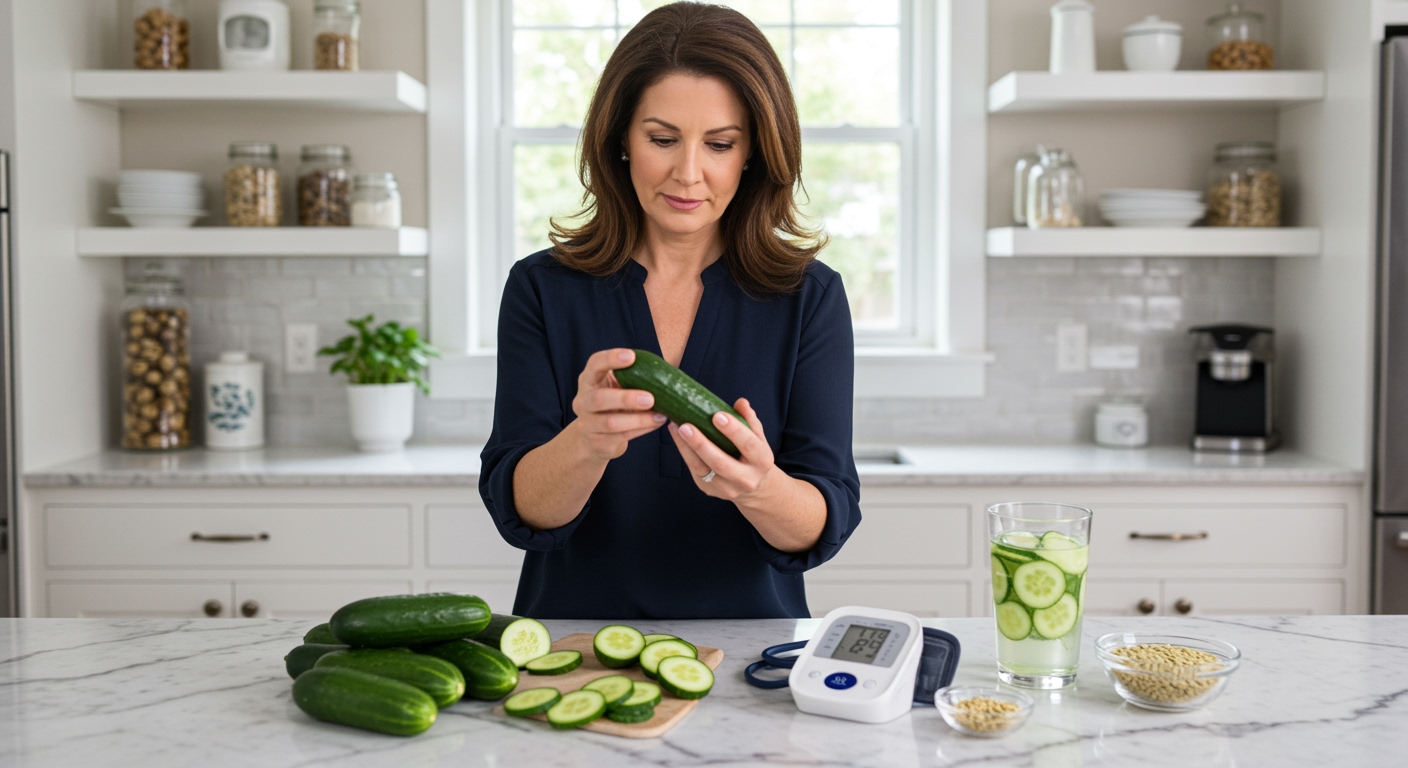✪ Key Takeaway: Hypotension patients can safely eat cucumber in moderate amounts as it provides hydration and nutrients without significantly lowering blood pressure.
Introduction
Your doctor just told you that your blood pressure runs too low and you need to watch what you eat.
Now you are wondering if that refreshing cucumber in your salad might be making your hypotension worse.
Hi, I am Abdur, your nutrition coach and today I am going to explain exactly how cucumber affects low blood pressure and whether you should avoid it.
What Does Cucumber Actually Do To Blood Pressure?
Cucumber contains about 95% water and very little sodium, which makes people worry it might lower blood pressure too much.
The truth is that cucumber has a mild diuretic effect because of its high water content and potassium levels.
However, this effect is much weaker than what you get from prescription diuretics or even other foods like watermelon.
Research shows that cucumber contains compounds called cucurbitacins that may have some blood pressure lowering properties.
But the concentration of these compounds in regular cucumber is too low to cause significant changes in most people.
Your body processes the water from cucumber slowly, so it does not cause sudden drops in blood volume like some medications might.
✪ Fact: One medium cucumber contains only 16 calories and provides 14% of your daily vitamin K needs.
How Much Potassium In Cucumber Affects Hypotension?
Potassium helps your kidneys remove excess sodium from your body, which can lower blood pressure in people with normal or high levels.
One medium cucumber contains about 150 milligrams of potassium, which is relatively small compared to bananas that have 420 milligrams.
For hypotension patients, this amount of potassium is generally not enough to cause problematic blood pressure drops.
Your kidneys are very good at maintaining electrolyte balance when you consume normal food amounts.
The bigger concern would be if you ate massive amounts of cucumber daily or drank large quantities of cucumber juice.
Most people with hypotension can safely eat 1-2 medium cucumbers per day without worrying about blood pressure effects.
✪ Pro Tip: Monitor your blood pressure for a few days after adding cucumber to see how your body responds.
Should You Worry About Cucumber Water And Hypotension?
Cucumber water has become popular as a healthy drink, but hypotension patients often wonder if it is safe.
The concentration of active compounds in cucumber water is actually lower than eating whole cucumber because you are mainly getting the water-soluble nutrients.
Most cucumber water recipes use just a few slices per glass, which means you get even less potassium and other compounds than eating the whole vegetable.
The main concern with cucumber water is not the cucumber itself but the increased fluid intake that might dilute your blood sodium levels.
If you drink several glasses of cucumber water daily, you might experience mild blood pressure drops from the extra hydration.
For most hypotension patients, 1-2 glasses per day of cucumber water is perfectly safe and can actually help with hydration.
✪ Note: Add a pinch of sea salt to your cucumber water if you are concerned about sodium levels.
What Are The Benefits Of Cucumber For Hypotension Patients?
Cucumber actually offers several benefits for people managing low blood pressure conditions.
The high water content helps maintain proper blood volume, which is crucial for people with hypotension who often struggle with dehydration.
Cucumber provides vitamin C and antioxidants that support healthy blood vessel function and circulation.
The fiber in cucumber helps with digestive health and can prevent constipation, which sometimes worsens hypotension symptoms.
Unlike processed snacks, cucumber provides nutrients without added sodium, artificial preservatives, or other chemicals that might interfere with blood pressure medications.
The cooling effect of cucumber can help during hot weather when hypotension symptoms often get worse due to heat-related blood vessel dilation.
✪ Fact: Cucumber skin contains most of the fiber and many nutrients, so eat it unpeeled when possible.
When Should Hypotension Patients Avoid Cucumber?
There are specific situations where hypotension patients should be more careful with cucumber consumption.
If you take blood pressure medications or diuretics, large amounts of cucumber might enhance their effects and cause blood pressure to drop too low.
People with severe hypotension who experience frequent fainting or dizziness should monitor their response to any new foods carefully.
During illness, fever, or dehydration, your blood pressure regulation is already compromised, so timing matters with cucumber intake.
If you notice increased dizziness, fatigue, or other hypotension symptoms after eating cucumber, reduce the amount or avoid it temporarily.
Always consult your healthcare provider before making significant dietary changes, especially if you take prescription medications for blood pressure management.
✪ Pro Tip: Keep a food and symptom diary to identify any patterns between cucumber intake and your blood pressure symptoms.
The Bottom Line
Hypotension patients can safely enjoy cucumber in normal amounts without worrying about dangerous blood pressure drops.
Your body is smarter than you think, and moderate cucumber consumption supports rather than harms healthy blood pressure regulation.
I would love to hear about your experience with cucumber and blood pressure management, so please share your thoughts or questions in the comments below.
References
At NutritionCrown, we use quality and credible sources to ensure our content is accurate and trustworthy. Below are the sources referenced in creating this article:
- WebMD: Cucumber Uses, Side Effects & Warnings
- Cleveland Clinic: The Health Benefits of Cucumbers
- Healthline: Cucumber Water: Benefits, How to Make It, and More
- Apollo247: Is Cucumber Good for High Blood Pressure?





